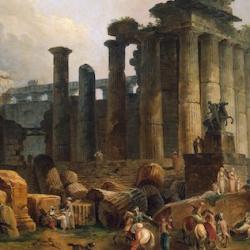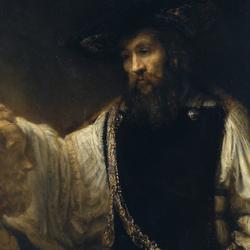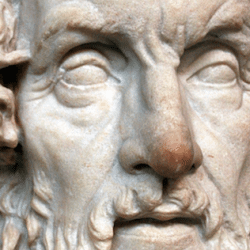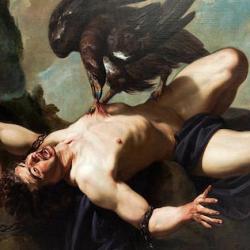Stephen Halliwell begins his Greek Laughter by calling attention to the difference between philosophical and poetic notions of divine laughter. Most Greeks had no doubt that “laughter (and smiles) had an important place in the divine realm; a deity incapable of laughter was the exception, not the rule.”
Homer expresses this popular view: “The remarkable Homeric images, in both the Iliad and Odyssey, of collectively ‘unquenchable’ or irrepressible laughter among the Olympians—laughter, what’s more, directed by gods against other gods—are the most concentrated testimony to the character of those traditions. But they were far from unique. In addition to other passages in the Homeric poems themselves, depictions of divine laughter appear in numerous texts and in all periods of Greek literature. . . . Nor is the idea of the laughter of gods exclusively ‘literary.’ . . . it informs a great deal of practical Greek religion, helping to explain the ethos of many of its festivals and rituals, not least those in honour of Demeter and Dionysus, deities both thought of as capable of laughter in rather distinctive ways. The very concept of religious festivity . . . is closely entwined in Greek thought with notions of ‘play’, celebration and laughter; and it makes no sense to worship the gods in this way unless they themselves can somehow appreciate and share the spirit of laughter, as Homer and others had shown them doing.”
Philosophers generally rejected the notion. Plato, “in a gesture of radical theological revisionism (and bodily puritanism)” repudiated “belief in gods who were ‘lovers of laughter’ (philogelotes) and who could be ‘overcome’ by it.’ Some of Plato’s later followers in turn resorted to allegorical readings of Homer to resolve what they saw as the problem.” Aristotle held the same view: “there was no room for belief in laughter as a trait of the divine. For him, therefore, laughter was one of the things which helped define a peculiarly human position in the world, suspended between the domains of animals and gods.”
The philosophers didn’t win the day, or not the whole day: “the tenacity of the older model of the divine within Greek culture was such that Choricius of Gaza, a rhetorician working in the sixth century ad against a mixed background of pagan and Christian values, felt able to claim that laughter, alongside rationality (logos), was actually one of two features which humans shared with the divine and which separated them from ‘irrational nature’, i.e. from other animals.”














